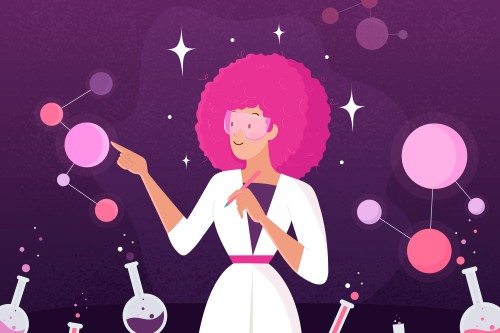
Message from Ms. Audrey Azoulay, Director-General of UNESCO, on the Occasion of the International Day of Women and Girls in Science文章源自英文巴士-https://www.en84.com/14174.html
教科文组织总干事奥德蕾·阿祖莱妇女和女童参与科学国际日致辞文章源自英文巴士-https://www.en84.com/14174.html
文章源自英文巴士-https://www.en84.com/14174.html
11 February 2023文章源自英文巴士-https://www.en84.com/14174.html
2023年2月11日文章源自英文巴士-https://www.en84.com/14174.html
文章源自英文巴士-https://www.en84.com/14174.html
Science is many things: a study of natural, physical and social phenomena; a process to test hypotheses and draw conclusions; a journey of discovery to understand the world’s many mysteries. But what science should be is equitable, diverse and inclusive. It should be for all and open to all, especially women.文章源自英文巴士-https://www.en84.com/14174.html
文章源自英文巴士-https://www.en84.com/14174.html
科学是对自然、物理和社会现象的研究,是检验假设、得出结论的过程,也是探究世界诸多奥秘的发现之旅。但科学更应该是公平、多样和包容的。科学应当造福大众并且向全民特别是女性开放。文章源自英文巴士-https://www.en84.com/14174.html
文章源自英文巴士-https://www.en84.com/14174.html
Today, just one in three researchers is a woman, according to the latest UNESCO Science Report. In higher education, women represent just over 35 per cent of graduates in STEM-related fields, according to the UNESCO Institute for Statistics.
据最新的《教科文组织科学报告》调查,目前,每三位科研人员中只有一位是女性。而根据教科文组织统计研究所的数据,在高等教育层面,科学、技术、工程、数学(STEM)相关领域女性毕业生占比仅略高于35%。
If these gender inequalities are so significant, it is because they are deeply rooted in our societies. It is because of the persistence of gender stereotypes and prejudices, which sometimes persuade girls that scientific studies are not for them, despite their tremendous potential.
这些性别不平等现象之所以如此显著,是因为它们根植于我们的社会,也是因为性别成见和偏见根深蒂固,有时甚至让颇具潜力的女童自认为不适合从事科学研究。
At UNESCO, where we work to build peace in the minds of men and women, addressing these stereotypes is a priority – because more women in science means better science. This conviction underpins all our work in this domain, and is enshrined in our Recommendation on Open Science, adopted by all our Member States in 2021.
在努力“于人之思想中筑起保卫和平之屏障”的教科文组织,破除这些陈规定型观念是一项优先工作,因为更多妇女参与科学有助于打造更好的科学。这一信念为我们在该领域的所有工作奠定基础,也铭刻在2021年全体会员国通过的《开放科学建议书》之中。
This vigilance is all the more necessary at a time when equal access to education can never be taken for granted – as we saw recently, when women in Afghanistan were brutally deprived of their right to learn and teach, including in higher education. UNESCO condemns this violation of a fundamental right and calls for it to be restored without delay.
在平等接受教育尚未充分实现之时,我们更不能掉以轻心。不久前,我们看到阿富汗妇女被粗暴剥夺了学习和教学的权利,其中包括在高等教育领域。教科文组织谴责对这一基本权利的侵犯,并呼吁立即予以恢复。
Today, all around the world, UNESCO is working to foster environments that encourage girls and women to study scientific topics – for example, by supporting a scientific mentorship programme in East Africa. To date, it has reached 11 million students, especially girls.
今天,教科文组织努力在世界各地营造鼓励女童和妇女学习科学的有利环境。例如,本组织在东非支持一个科学导师计划,该计划迄今已惠及1100万名学生,特别是女童。
UNESCO also seeks to break down stereotypes, by raising awareness of women scientists who are blazing new trails. Through our 25-year partnership with the L’Oréal Foundation, we have honoured over 120 exceptional women scientists from around the world, five of whom have also received the Nobel Prize. As role models, they are examples for young women to follow – underlining that they too can achieve excellence.
教科文组织还力求通过宣传正奋力开拓的女性科学家,来打破陈规定型观念。通过与欧莱雅基金会长达25年的合作,我们表彰了来自世界各地的120余名杰出女性科学家,其中5人也获得了诺贝尔奖。她们为青年女性树立了榜样,证明她们同样可以取得骄人成就。
On this International Day of Women and Girls in Science, let’s reiterate this fundamental message: women need science, and science needs women. Only by tapping into all sources of knowledge, all sources of talent, can we unlock the full potential of science, and rise to the challenges of our time.
值此妇女和女童参与科学国际日,让我们重申这一重要讯息:妇女需要科学,科学也需要妇女。只有通过挖掘所有知识源泉和人才资源,我们才能充分释放科学的潜能,应对时代的挑战。

